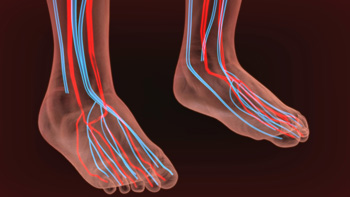
Poor circulation in the feet can lead to discomfort and long-term health issues if left untreated. Common signs of poor circulation include cold feet, numbness or tingling sensations, and swelling in the feet and ankles. People may also experience cramping or a feeling of heaviness, especially after standing or walking for extended periods. Discoloration, such as a bluish or pale appearance, is another warning sign. The causes of poor circulation in the feet often include conditions like diabetes, peripheral artery disease, or varicose veins, which affect blood flow. Additionally, smoking, obesity, and a sedentary lifestyle can contribute to poor circulation. Wearing tight footwear or sitting for long periods can also restrict blood flow to the feet. If these symptoms persist, it is suggested you seek treatment from a podiatrist to prevent further complications and improve circulation to the feet.
While poor circulation itself isn’t a condition; it is a symptom of another underlying health condition you may have. If you have any concerns with poor circulation in your feet contact Arthur Segall, Jr., DPM of Segall Foot and Ankle. Our doctor will treat your foot and ankle needs.
Poor Circulation in the Feet
Peripheral artery disease (PAD) can potentially lead to poor circulation in the lower extremities. PAD is a condition that causes the blood vessels and arteries to narrow. In a linked condition called atherosclerosis, the arteries stiffen up due to a buildup of plaque in the arteries and blood vessels. These two conditions can cause a decrease in the amount of blood that flows to your extremities, therefore resulting in pain.
Symptoms
Some of the most common symptoms of poor circulation are:
- Numbness
- Tingling
- Throbbing or stinging pain in limbs
- Pain
- Muscle Cramps
Treatment for poor circulation often depends on the underlying condition that causes it. Methods for treatment may include insulin for diabetes, special exercise programs, surgery for varicose veins, or compression socks for swollen legs.
As always, see a podiatrist as he or she will assist in finding a regimen that suits you. A podiatrist can also prescribe you any needed medication.
If you have any questions, please feel free to contact our offices located in Plantation, FL Ft. Lauderdale, F . We offer the newest diagnostic and treatment technologies for all your foot care needs.
